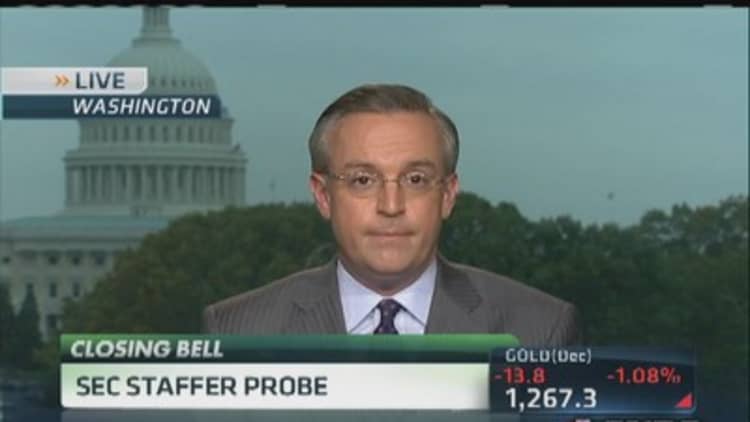Securities brokers who think California's state court system offers an easy path for erasing details from their public records may want to think again.
Wall Street's industry-funded watchdog is having some success as a fierce opponent.
One broker recently lost his 2.5-year California court battle to clear old complaints from his license. Another is fighting the Financial Industry Regulatory Authority (FINRA)'s efforts to move his case out of the state to federal court.
A state appeals court decision there last year gave some of the nation's 635,000 brokers hope that going to court in California could be an attractive alternative to FINRA's process for cleaning up, or expunging, unflattering details from their records. About 44 percent of U.S. brokers are licensed in California, according to the state's securities regulator.
(Read more: FINRA eyes new rule for brokerages)
That decision, in August 2012, made clear that California state judges could decide expungements based on what they thought was fair, instead of applying FINRA's expungement rules, which require proof that the information is false or erroneous.
But as the two current California cases show, anything is possible, even an unfavorable result. At the very least, brokers taking their cases to the Golden State can expect a fight, since they must name FINRA as a defendant. The regulator has opposed the brokers in these two cases at every turn.
Never too old
One of the brokers, Edwin "Mike'' Lickiss, cited problems that dated back to 1986, when he worked for a predecessor of the brokerage unit of LPL Financial Holdings Inc and started selling shares of a real estate investment trust, or REIT.
(Read more: Bear Stearns liquidators sue Moody's, S&P, Fitch)
The REIT filed for bankruptcy in the early 1990s, after its manager took $7.2 million in cash. Then, 17 customers filed a total of $1.5 million in arbitration cases against Lickiss, alleging that he did not disclose the risks. While most of them settled, the details are still on his public record.
Now, they will stay. "The public interest is best served when investors and regulators have complete access to accurate information regarding the history'' of brokers, wrote California Superior Court Judge Steven Austin in an Oct. 21 opinion.

"We are disappointed with the court's ruling in this case but of course will respect it,'' said Jeffrey S. Salisbury, Lickiss' lawyer in Eugene, Ore. Lickiss, a broker since 1977, now works for California-based Investment Architects. The firm's president did not return a call requesting comment.
The judge noted that securities arbitrators heard cases in two of the 17 complaints. They found against Lickiss and awarded the investors a total of $140,000 in those two cases. A total of more than $800,000 was paid to the investors in the 15 cases that settled, the court wrote.
Lickiss did not allege in his court case that those decisions were wrong, or that claims in the settled cases were false or in error, the court wrote. Instead, his arguments hinged on the disclosures simply being too old.
(Read more: Black marks routinely expunged from broker records)
"If someone wants an expungement, they have to do a better job than that,'' said Seth Lipner, a New York-based securities arbitration lawyer for investors who recently studied expungement procedures for an upcoming law review article.
While no other complaints have surfaced about Lickiss since 1996, "it does not change the fact that at one point in his life he was capable of committing multiple acts of serious professional misconduct and fraud,'' the judge wrote.
A FINRA spokeswoman declined to comment.
Litigation limbo
FINRA's resistance against a broker in another lawsuit signals what others can likely expect if they head to California's courts to clear their records: FINRA moved the case to federal court. A federal court should hear the case because federal law requires FINRA to regulate securities firms and brokers, FINRA wrote in court documents.
(Read more: Fed probing New York SEC staff investments)
Now the broker, who works at Bank of America's Merrill Lynch unit and identifies himself with the pseudonym, John Doe, is fighting to move the case back to state court. A spokesman for Merrill Lynch, which is not a party in the suit, declined to comment.
A hearing on the issue is set for Monday. If Doe loses and the case stays in federal court, the judge could hear arguments that same day about FINRA's request to throw the case out.
Doe's Los Angeles-based lawyer, Jeffrey Riffer, said he was optimistic that the federal judge would send the case back to state court. That happened in the Lickiss case, after FINRA moved it to federal court
(Read more: Banks consider booting traders from chat rooms)
Regardless, brokers should think twice before bringing expungement cases in California courts unless they live or actually work there, said Tom Lewis, a lawyer in Lawrenceville, New Jersey who represents brokers in employment issues.
Having a California license may not be enough, on its own, to convince an already overworked state court system that such a case actually belongs there, Lewis said.
"A judge can easily see through that,'' Lewis said. ``It will get shut down quickly.''
—By Reuters

